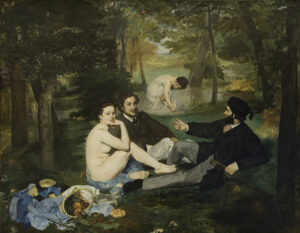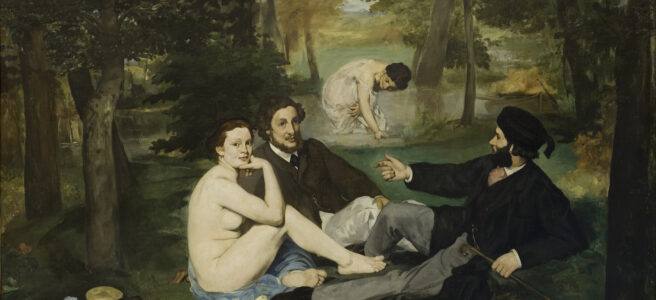The focus of this brief essay is the prolific, prodigious, and Protean musical use of assonance by William Shakespeare in his poems and plays.
Question: What is assonance?
Assonance is simply the repetition of vowel sounds. One word which exemplifies assonance well is “picnic” with the repetition of the short i sound. An easy way to remember the correspondence between assonance and picnic is to envision the famous and scandalous painting by Edward Manet, “Le Déjeuner sur l’herbe,” lunch on the lawn, i.e. picnic.

The characters depicted in the picture with their picnic, like most characters on a picnic, probably have their own ass-on-ants.
What are the elements found in Shakespeare’s tool box? “Words, words, words,” as Hamlet replied to Polonius when asked what he was reading. Of what do words consist? Vowels and consonants. All of the English vowels — A-E-I-O-U and the ever-curious Y — all possess multiple sounds. Vowels are created with an open mouth, lips and teeth parted, with no tongue tapping teeth or upper palette.
It should be remembered that Shakespeare’s plays were meant to be heard, not read. Therefore, he needed to have words that would both tease and please and also caress and impress the ear. “Sounds that give delight and hurt not,” as Caliban observed in The Tempest.
***
“If I profane with my unworthiest hand
This holy shrine, the gentle sin is this:
My lips, two blushing pilgrims, ready stand
To smooth the rough touch with a tender kiss.”
(Romeo and Juliet Act I, Scene v)
The excerpt above is Romeo’s first words to Juliet during the party scene in Act I, scene v. Shakespeare reveals his verbal virtuosity by including their first encounter in the form of a sonnet.
This quatrain contains many instances of assonance, which we noted is the repetition of vowel sounds. For instance, there are twelve instances of the short “I” vowel and 4 instances of the long “I” vowel.
***
Some poets on the vowel prowl choose to use single vowel sounds as in e. e. cummings’ [in Just-], where the world is “mud-luscious” and “puddle-wonderful.” Shakespeare also uses single vowel sounds in triplicate as with “sin is this” and “blushing pilgrim.” In line four, we also find assonance in duplicate with “to smooth” and “rough touch”, which echo the vowel sounds from line three which are, “two blushing.”
Shakespeare also creates interest with what I call sequential assonance, which is the repetition of different vowels in sequence. Examples of this are the opening, “if I” followed by “with my” (line 1) and “this shrine” (line 2). He then inverts this sequence with the first words of line three, “my lips.”
To dissect poetry in this way may restore the resplendent aroma of the blessed day when we dissected frogs in high school biology. Frogs are at their most magnificent when alive and jumpstarting Mark Twain’s literary career with “The Celebrated Jumping Frog of Calaveras County.” Or, when serenading Dionysus on his Hades vacation in Aristophanes’ comedy “The Frogs.” In a similar vein, Shakespeare comes alive when the words are heard. I encourage everyone to enjoy the physical fun of reading Shakespeare aloud, allowing the syllables to inhabit the cavity of chest and mouth. “Speak the speech, I pray you, as I pronounced it to/ you, trippingly on the tongue.” (Hamlet Act III, Scene ii)
***
“Two households, both alike in dignity,
In fair Verona, where we lay our scene,
From ancient grudge break to new mutiny,
Where civil blood makes civil hands unclean.”
(Romeo and Juliet, Prologue)
The first quatrain in the prologue of “Romeo and Juliet” is rich with instances of assonance. In line one, the open “o” of both “households” and “both” butt up against each other. “In dignity” is a short “i” triple play.
Line two bears the cherished, “fair Verona, where.”
Line three has another triplet, “to new mutiny.”
And lines three and four have a quartet – “from,” “grudge,” “blood,” and “unclean.”
In line four, “civil” like “picnic” is a single word that has interior assonance.
How infinite in faculty, facility, and felicity is Shakespeare. The tenure and scope of his genius so easily exceeds the cabined and cribbed confines of this brief essay, which treats but one aspect, assonance, in his panoply of literary gifts. My hope is that as you read and hear Shakespeare, your eye and ear will have an expanded appreciation and apprehension of the beautiful, musical use of assonance contained in the creations of our upstart crow, the protean, prolific, poetic, Prometheus. “O for a Muse of fire!”
